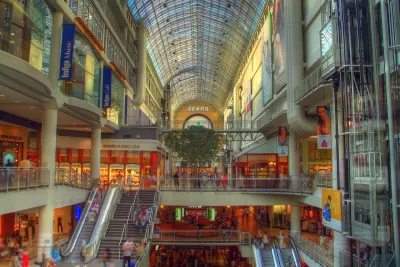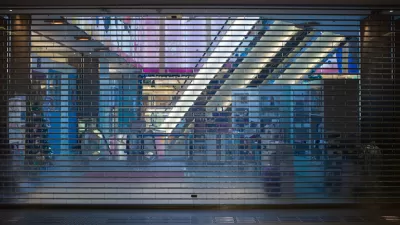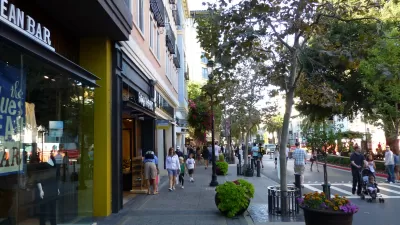Despite threats like online retail, upscale sectors of the mall market are prospering. This is good news for what are, perhaps, the only walkable 'streets' in some parts of the country.

Some shopping malls are closing, but many more remain entirely viable. Amanda Kolson Hurley reports on the specifics. "Most malls are owned by a handful of publicly traded real-estate investment trusts (REITs), and the big players who specialize in higher-end malls are doing well. The top three—Simon Property Group, General Growth Properties, and Macerich—have seen their stock prices rise since 2012."
To succeed today, malls need to be interesting. And they do that by projecting affluence and "lifestyle" options. From the article: "Meanwhile, malls are working hard to drum up more foot traffic. Increasingly, higher-end shopping malls peddle an experience, not just goods. They have real restaurants and cafes instead of wan food-court fare, ritzy salons, and maybe a Whole Foods where a department store used to be."
Counter-intuitively, any real loss of public interest in mall spaces may not be a good thing: "Urbanists like to think that the American mall is a relic. But the truth is that until more suburbs redevelop to become denser and walkable, the mall is the best communal—though not really public, alas—space that we've got."
FULL STORY: Shopping Malls Aren't Actually Dying

Alabama: Trump Terminates Settlements for Black Communities Harmed By Raw Sewage
Trump deemed the landmark civil rights agreement “illegal DEI and environmental justice policy.”

Study: Maui’s Plan to Convert Vacation Rentals to Long-Term Housing Could Cause Nearly $1 Billion Economic Loss
The plan would reduce visitor accommodation by 25% resulting in 1,900 jobs lost.

Planetizen Federal Action Tracker
A weekly monitor of how Trump’s orders and actions are impacting planners and planning in America.

Wind Energy on the Rise Despite Federal Policy Reversal
The Trump administration is revoking federal support for renewable energy, but demand for new projects continues unabated.

Passengers Flock to Caltrain After Electrification
The new electric trains are running faster and more reliably, leading to strong ridership growth on the Bay Area rail system.

Texas Churches Rally Behind ‘Yes in God’s Back Yard’ Legislation
Religious leaders want the state to reduce zoning regulations to streamline leasing church-owned land to housing developers.
Urban Design for Planners 1: Software Tools
This six-course series explores essential urban design concepts using open source software and equips planners with the tools they need to participate fully in the urban design process.
Planning for Universal Design
Learn the tools for implementing Universal Design in planning regulations.
Caltrans
Smith Gee Studio
Institute for Housing and Urban Development Studies (IHS)
City of Grandview
Harvard GSD Executive Education
Toledo-Lucas County Plan Commissions
Salt Lake City
NYU Wagner Graduate School of Public Service





























